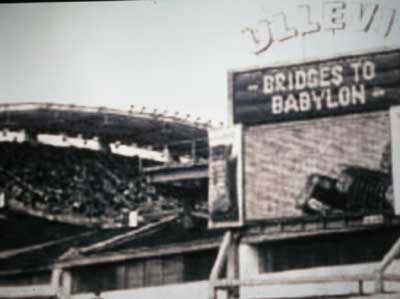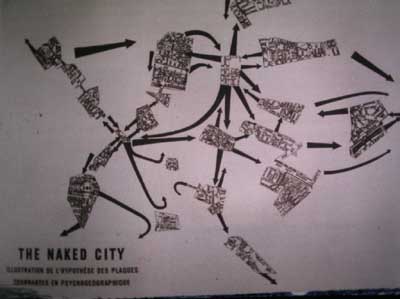
The utopian project New Babylon was developed out of the
situationist movement in the late 50ies; it clearly stands in a line with
situationism and it has to bee seen embedded both in the artistic avantgarde
and in the social struggles of that time – so maybe we should first
sketch out some basic ideas of situationism. The Situationist International
was a follow-up to the Paris-based Lettrist International. Both organisations
share both their understanding as being revolutionary art movements andtheir
fascination with urban space as the stage of a daily struggle against
functionalist capitalism. Guy Debord is often acknowledged as the central
figure of situationism. When he is often described as activist, artist,
writer, we can see the arena in which he and the other situationist acted
in.
In his famous piece "The Naked City" from 1959 some main ideas
are represented. "The Naked City" is cut-up and re-configured
map of Paris, putting new connections between certain areas. It is more
a mind-map, actually.

One of the techniques the situationists invented was the
"derive". It means a kind of aimless wandering, a drifting through
the city (here we can see the lines back to surrealism as well). The derive
was meant as an act of resistance to the hegemonic functionialism, upon
which capitalist (as well as socialist) society was based. Situationism
clearly detected functionalism as one of the keys through which capitalism
worked. Here in Sweden we can see extremely well, how such an over-all
functionalist approach forms a society. Every detail of such a model is
exactly planned, capitalism organizes every small aspect of social life.
Sweden is actually in many aspects the role-model of the 20th century
welfare state, Fordism, the capitalist compromise between workers and
owners of production, is somehow the doctrine on which the whole social-democtraic
swedish model is based on... and that we can see in the architecture,
if we look at the suburbs as an outcome of functionalist city planning.
Anyway, the situationists said:
You have to tear apart the grid of the city and find your own ways and
not fall into the everyday capitalist life.
The overall organization of social life was also described by Michel Foucault
with the theory of the disciplinary society. He states that within such
a society you move from one closed milieu to another: you start in the
family, then go to school, maybe to military, afterwards into factory
and if things do not work out to the hospital or maybe to the prison.
Life is organized through this institutions, and they are all somehow
structured in the same way, their functions are analogous.
The situationists, along with the upcoming revolutionary ideas of that
time, were opposed to this kind of disciplinary regime. They wanted to
break up the divisions between the separated fields. especially in the
realm of the city. Their main programm, the unitary urbanism, was to abolish
all seperations between work and leisure time, between public and private
space.